Agnostic Pulp
Into (and Out Of) the Chapel Perilous with Robert Anton Wilson
“A few weird moments can be a liberating experience for those who aren’t scared to death by them.” -Robert Anton Wilson
A few years back, I started keeping a journal I named The Weirdening in which I would record the weirdest thing that happened to me each day. I had “recently completed VALIS and [was] not yet ready to leave that world.” This would be a good Practice for drawing some weirdness out of the mundane, I thought, and it was, while it lasted. Going back over the entries, which cover 9/3/21-2/11/22, some days are certainly weirder than others, such as when while snorkeling in the river I felt a fish urging me to follow it. We were in a popular swimming spot, but I had it to myself. I lived nearby and used to walk down early in the morning to enjoy the water before the crowds.
The fish would swim ahead a little and then turn and watch me, as if waiting for me to catch up. In this way it led me fifty meters or so upstream to a shard of broken glass lodged in the rocks, sticking straight up, just waiting for an unsuspecting foot. I swam down and removed the sharp intrusion, and when I looked up again my companion was gone.
It wasn’t always so weird as communing with the animal kingdom. On another day, my wife and I were out on a picnic, sitting on the bank of a slow moving creek, a small cooler of snacks we brought from home between us. We had packed some dish that really required a fork, which we had forgotten to include in our bag. Now had we been in my wife’s vehicle, this would have been no problem. Her center console is divided and subdivided and practically alphabetized, containing the solution to every ailment known to man, but we’d been expecting rough terrain en route to our destination so were in my old truck, notorious for its unpreparedness. Sneeze and there will not be a kleenex (although I might be able to scrounge up an old receipt for you), phone dies and there will not be a charger, etc.
Anyway, I walked back to the parking lot fully expecting not to find anything, but at least to humor my wife who could not comprehend of a vehicle without a stash of plasticware. Lo and behold, I opened the center console and found it totally empty except for a single plastic-wrapped fork lying at the bottom. It sounds like nothing, I know, but in the moment it felt like a miracle.
Unfortunately, this journal wasn’t a Practice I kept up beyond the duration of that one Moleskin. Who can say why? It is not because it was not fruitful. Indeed, over the course of those five months, I noticed far more of the myriad weird occurrences that our brains are so adept at filtering out. It made the world more alive, more mysterious, and, even if only because I leaned into it a bit from time to time, more fun. I wasn’t trying to pin these occurrences down, a la Fox Mulder, into some grand narrative. I was perfectly content to dwell in the mystery, to practice what Robert Anton Wilson calls General Agnosticism, a Practice of holding things lightly, and non-dogmatically.
As Wilson writes, “when dogma enters the brain, all intellectual activity ceases” (ix). This is not a viewpoint I sign off on totally. It, too, I hold lightly. While I hesitate to call myself a full-fledged Zen Buddhist, I might say I am Buddhish (to steal a joke from Weird Studies), and getting more so all the time. True, Zen is not dogmatic in the same sense as some monotheistic religions, but my half-ass adherence to some of its Practices has helped me to understand the appeal of taking shelter in something established. Perhaps I am only trying to weasel my way out of a trap here, but I hold RAW’s Agnosticism agnostically, as well.
For all its noncommittal allure, experimenting with High Strangeness is a spiritual path, one with fewer guardrails than most, and, as such, fraught with danger.
Chapel Perilous
“Chapel perilous, like the mysterious entity called ‘I,’ cannot be located in the space-time continuum; it is weightless, odorless, tasteless and undetectable by ordinary instruments. Indeed, like the Ego, it is even possible to deny that it is there. And yet, even more like the Ego, once you are inside it, there doesn’t seem to be any way to ever get out again, until you suddenly discover that it has been brought into existence by thought and does not exist outside thought. Everything you fear is waiting with slavering jaws in Chapel Perilous, but if you are armed with the wand of intuition, the cup of sympathy, the sword of reason and the pentacle of valor, you will find there (the legends say) the Medicine of Metals, the Elixir of Life, the Philospher’s Stone, True Wisdom and Perfect Happiness” (Wilson 6).
Cosmic Trigger is Robert Anton Wilson’s nonfiction account of the author’s descent into, and escape from, what he calls Chapel Perilous, a somewhat nebulous term we must nevertheless try to define. In the High Weirdness chapter Erik Davis devotes to Wilson, he calls the Chapel Perilous “a weigh-station of paranormal possibility” (219). It can also be thought of as the anti-structural phase of an initiation ritual, the testing ground an initiate must pass through, or the dangerous enclosures in which a knight-errant must prove themself. In more psychological terms, it is the test of a mind that has been presented with something extraordinary. Does it deny or repress the extraordinary event in order to retain the pre-existing reality tunnel, as Wilson calls our mental formulations of the possible, or does it accept the extraordinary, thereby reshaping its own framework? In this way, the internet, too, might be part of Chapel Perilous, a zone in which one will quickly lose themselves without the aid of Wilson’s prescribed tools: intuition, sympathy, reason, and valor1.
SO SOMETHING UNEXPLAINABLE HAPPENED TO YOU AND YOU AREN’T WILLING TO SIMPLY IGNORE NOR BLINDLY ACCEPT ITS PREMISES. WHAT ARE YOU TO DO?
There is but one choice. You must enter into that liminal anti-structural zone and go searching for answers. It is these adventurers who are at risk of finding themselves lost in the hall of mirrors that is Chapel Perilous.
Thomas C. Foster cites Pynchon’s The Crying of Lot 49 as a modern example of the Chapel. The film Under the Silver Lake (2018), Daniel Clowes’ comic Like a Velvet Glove Cast in Iron, and the paranormal television series, Helier, could all fall into a similar category. In each of these examples, an investigation is undertaken, and the very act of investigation seems to cause a correlating deepening. The rooms of Chapel Perilous open up before the explorers ad infinitum. Synchronicities act as breadcrumbs leading those who would investigate ever deeper. There is a deluge of meaning, but it is never quite clear whether any of the apparent connections are real, or merely the Fae trickery of deepening paranoia.
RAW enters the Chapel on July 23, 1973. At the time, his now famous Illuminatus! trilogy was largely complete, but he had not yet found a publisher, and he was living in varying states of precarity: sometimes on a communal farm, sometimes in Mexico, sometimes on welfare, other times quite comfortably as an editor for Playboy, but always with his family, fellow practitioners in the Weird. That is to say, Wilson was no novice when he stepped into the Chapel. He’d been consciously exploring the limits of his own mind through peyote, LSD, meditation, ceremonial magic, hypnosis, divination, and other means popular amongst the counter culture of the time.
Wilson was already a daring and capable proto-chaos magician. While he did not prescribe to any one religion or belief system other than the meta-game of his agnosticism, he was a master of the Magic Circle, able to step into practically any belief that suited his needs. Within whatever circle he drew for himself, he banished his innate skepticism, for it prevented results. Only once the ritual was complete, and he stepped out of the circle, did he apply rationality, a tool of equal or greater importance to him than any other he wielded.
If the Chapel is thought of as an initiation ritual, than it should come as no surprise that a bold and daring Magician intent on leveling up, so to speak, would eventually find himself enmeshed deep within such a plane.
In The Trickster and the Paranormal, George Hansen explores similar territory through the work of two anthropologists, Arnold van Gennep and Victor Turner. Both van Gennep and Turner studied the role of ritual, specifically rites of passage. They each marked three stages to these initiatory ceremonies. Turner named them: separation (preliminal), liminality (liminal), and reintegration (postliminal). To translate somewhat into Wilson’s preferred language, there is the individual existing in their reality tunnel, or mental imprint, humming along quite naturally until some extraordinary event happens that breaks the limits of their understanding of reality. This can be, and often is, ignored and forgotten, but if it is not then that marks stage one, separating the individual from their preconceived notion of reality. Looking into the matter would mark stage two, liminality, that is the Chapel Perilous. Emerging from the other end with a new understanding, a new reality tunnel would then, of course, be reintegration.
But it’s the liminal stage we are here interested in. That’s the fun one, after all. Turner sometimes refers to this stage as anti-structure, differentiating it from the old structure and the new structure that mark either end. It is in the middle phase when things become loosey-goosey, the usual laws fall away, reality becomes malleable, and Trickster rules.
“The trickster has essentially the same properties as liminality [and] anti-structure,” Hansen writes (59). Chapel Perilous is his domain. To pass through, one must match wits with this witless entity. One must be able to play any game the trickster presents. This is best done by becoming the trickster’s foil, that is the Magician, the one who meets the universe in a spirit of play. Rachel Pollack refers to the first major arcana as a “trickster-wizard” (30) and a “trickster-conjurer” (32). The Magician has inoculated themself against the trickster by taking a part of it into themself. The illness as the cure.
“The trickster and the shaman represent opposing worldviews, [but] the two are found side by side” (88) Hansen concurs.
Wilson himself has an understanding of this. His advice for entering the Chapel draws unmistakable parallels to The Magician who is traditionally shown standing before a table containing all four symbols of the minor arcana: the wand, the cup, the sword, and the pentacle.
Early on in the book, Wilson warns the reader that if you go into that realm without the sword of reason, you will lose your mind. Without the cup of sympathy, you will lose your heart. Without the wand of intuition, you will never even recognize when you have arrived. And, without the pentacle of valor, your courage will fail you.
Got That Dog in Him
It was through a Tantric sex trance, entered into with the assistance of LSD and ‘the Most Beautiful Woman in the Galaxy’ (AKA Wilson’s charming nickname for his wife Arlen), and experimenting with a hypno-tape, that Wilson broke through the Chapel doors, and found himself immersed in the Sirius Mystery.
“Sirius is very important,” RAW scribbled in his magickal diary the next morning. This is the beginning of a synchronicity storm centering upon the dog star that would go on until October 1974, during which time he “entered a belief system…in which [he] was receiving telepathic messages from entities residing on a planet of the double star Sirius” (8).
Let us recall, it was during this time that Wilson was waiting for a publisher to pick up Illuminatus! He was flat broke and losing faith in writing as an avenue by which to make a living. “The Wilson family was living, like all Welfare families, in a slum apartment building, infested with roaches, and full of other social rejects” (156). Trickster is drawn to such marginal places, as Hansen writes: “status loss can also serve as an impetus in the development of tricksters” (61).
It was under these conditions that Wilson was prone to losing himself in Chapel Perilous. He had already become obsessed by the number 23 and the eye-in-the-triangle design, but after his experience on July 23, 1973, he became convinced he was receiving transmissions from the dog star,, the same star Aleister Crowley’s Holy Guardian Angel is meant to be a denizen of. “Sufi historian Idries Shah traces the name of the Illuminati back to a verse in the Koran which mentions a shining star” (184), and Crowley’s alternative name for the group, which Wilson had recently lampooned in his unpublished trilogy that now seemed to be coming to life, was The Order of the Silver Star.
The synchronicities continue their warp and weft, constricting Wilson ever tighter in his web of connections, linking the Illuminati, ancient Egyptian gods, interstellar communications, Aleister Crowley, Timothy Leary, Tantra, Sufism, and, most importantly, Sirius (which gave this researcher his own startling synchronicity, for Wilson connects Sirius with “Atu XVII of the Tarot—The Star” (187), and I had recently been deeply involved with that card (and Crowley in connection) while doing research for a previous Gnostic Pulp essay).
“Synchronicity is the wink of the trickster,” Davis writes. “A strong synchronicity suggests (without confirming) the existence of a mischievous and almost paranormal network of intentionality” (247). It is easy to get drunk on the possibility of synchronicities, when caught in a storm of them, when each new occurrence seems to signify that you are on the right path. They are so teasingly coy, seemingly full of such concealed richness, that one cannot help but suspect following their trail to the end will doubtlessly reveal True Gold.
Davis goes on to expound upon the two levels of synchronicity: “one explicit and one implicit” (247). The first forms a link between elements of experience, such as Wilson’s repetition of the number 23, or Oedipa Maas’ trail of muted trumpets. The second, deeper level, implies a hidden “webwork of coordinated meaning” (247), and for this, goddammit, Davis cites a quote from Repo Man (1984), the same film that was on my own mind in a recently published essay, for which I use a screenshot of the film—oh Trickster, you enticing fox!
It is exactly this feeling that makes synchronicities so enticingly weird, and it is this lure that Trickster will use to draw one deeper into the winding halls of Chapel Perilous, and, then, just like that, the synchronicities will stop, and you will awake to your surroundings, totally lost.
Reintegration
Wilson travels a perilous path through the Chapel. He is a true Magician, in the Tarot sense. He is slippery, a player of games. Everything about him is hard to pin down, from his politics, where he refers to himself as a libertarian, but contrary to today’s conception he shows deep sympathy for the downtrodden, and pans Atlas Shrugged throughout Illuminatus! What confuses the reader, maybe, is that he is the one honest libertarian to exist, a stout defender of freedom, not only of the individual I, but of that “I as an other” Simon Critchley writes about in Mysticism.
“The ‘I’ finds its voice and itself through its relation to the otherness of God. Maybe this is why autobiographies without God are often so dull” (73).
This is about spot on as a description for what Wilson does in Cosmic Trigger. In doing so he breaks the dichotomy of spiritual exploration I laid out in Two Dicks by drawing together Ahab’s hunger for answers on one end and Ishmael’s anthropological pluralism on the other. He combines the two into something he refers to as trans religion, the meta-game, or, simply, agnosticism. While never a devout at any altar, he is able to jump between reality tunnels, holding them lightly, and not considering any to contain the Ultimate Truth. This is very Ishmaelian, in itself, but brought to such an extreme (and self-aware) a level that it is hard to consider them the same thing. Rather, he has gone off to the side and created a third point, The Magician, transforming the pole into a triangle (maybe one with an eye in the center?).
“One either passes through the Chapel Perilous a stone paranoid or an agnostic,” (6) Wilson writes, having eventually come out the other end. No easy feat. “To escape from an emotionally compelling, self-reinforcing belief system is no doubt as complex and nuanced as converting to one in the first place” (Davis 257). (Remember what I was saying about the Internet as Chapel Perilous? How many have become trapped in such emotionally compelling, self-reinforcing belief systems without being able to escape?)
Wilson credits his own escape, in part, to a conversation he had with ufologsist Jacques Vallee at a Crowleymass, quite the set and setting by which to escape.
Wilson lays it all out for Vallee, his entanglement with Sirius and the Illuminati, etc. Vallee listens without skepticism or the typical common sense arguments one might expect, but rather presents an alternative view. He agrees that something most certainly is going on, but he “argued equally strenuously that absurd encounters with alien intelligences should never be taken at face value” (258). He goes on to big dog Wilson out of his paranoia by presenting an even wilder speculation, namely that these encounters do not feature actual beings from other planets, but rather aspects of a terrestrial control system designed to tweak human culture and consciousness for purposes he did not claim to understand.
This theory added an entire new level even deeper than the meta-game Wilson envisioned himself as playing. He did not transcend the Chapel by discovering its deepest secrets, but recognized he’d been drawn in over his head and voluntarily backed out in order to "safeguard [his] sanity” (259), thereby enacting a very Zen suspicion that enlightenment might look less like this (solving the riddles of the universe):
and more like this (feeling at home in this universe, as expressed so brilliantly in Wim Wenders’ late career masterpiece, Perfect Days, the slice of life tale of Hirayama, a perfectly content public toilet cleaner living in Tokyo):
Cosmic Trigger concludes with an unexpectedly grim and heartbreaking final section about the senseless murder of Wilson’s teenaged daughter, Luna, who, until then, appears only sporadically, but always memorably, throughout the text. In one appearance, she has begun to paint in watercolors, and her father reports that “everything she did charmed me: it was always full of sun and light, in a way that was as overpowering as Van Gogh.”
When he asks her: “What do all these paintings mean?"
She replies, “I am trying to show the Clear Light” (134).
In some forms of Buddhism, Clear Light “is the innate condition of the mind, associated with buddha-nature, the realisation of which is the goal of meditative practice” (Luminous Mind).
This Clear Light breaks through for Wilson in his grief. A final series of synchronicities appears, but this time he is not lead into Chapel Perilous, but rather into a state of grace via connections between a poem written by his late daughter, a letter she had in her possession from Tim Leary, and a telegram Leary sends to Wilson at the news of his daughter’s passing.
The telegram reads:
YOU ARE SURROUNDED BY A NETWORK OF
LOVE AND GRATITUDE. WE ARE ALL WITH
YOU AND SUPPORT YOU
These messages, received in his grief, allow Wilson to pass into a new belief system in which “the Network of Love was not one hypothesis among many but an omnipresent Reality. Once my eyes were truly open to it, the Network was everywhere, in every tree, every flower, in the sky itself, and the golden merry light that had been Luna was part of it” (237).
Works Cited
Critchley, Simon. Mysticism, New York Review Books, New York, 2024.
Davis, Erik. High Weirdness, Strange Attractor Press, London, 2019.
Hansen, George P. The Trickster and the Paranormal, Xlibris, 2001.
Pollack, Rachel. Seventy-Eight Degrees of Wisdom, Element, London, 1997.
Wilson, Robert Anton. Cosmic Trigger, New Falcon Publications, Scottsdale, 1992.
Should we, then, be teaching Boomers magick rather than bothering them with half-measures like media literacy?


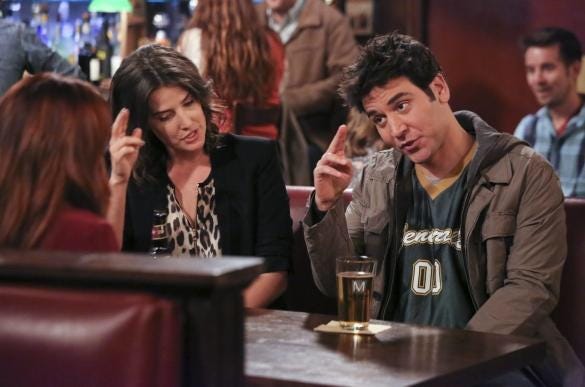
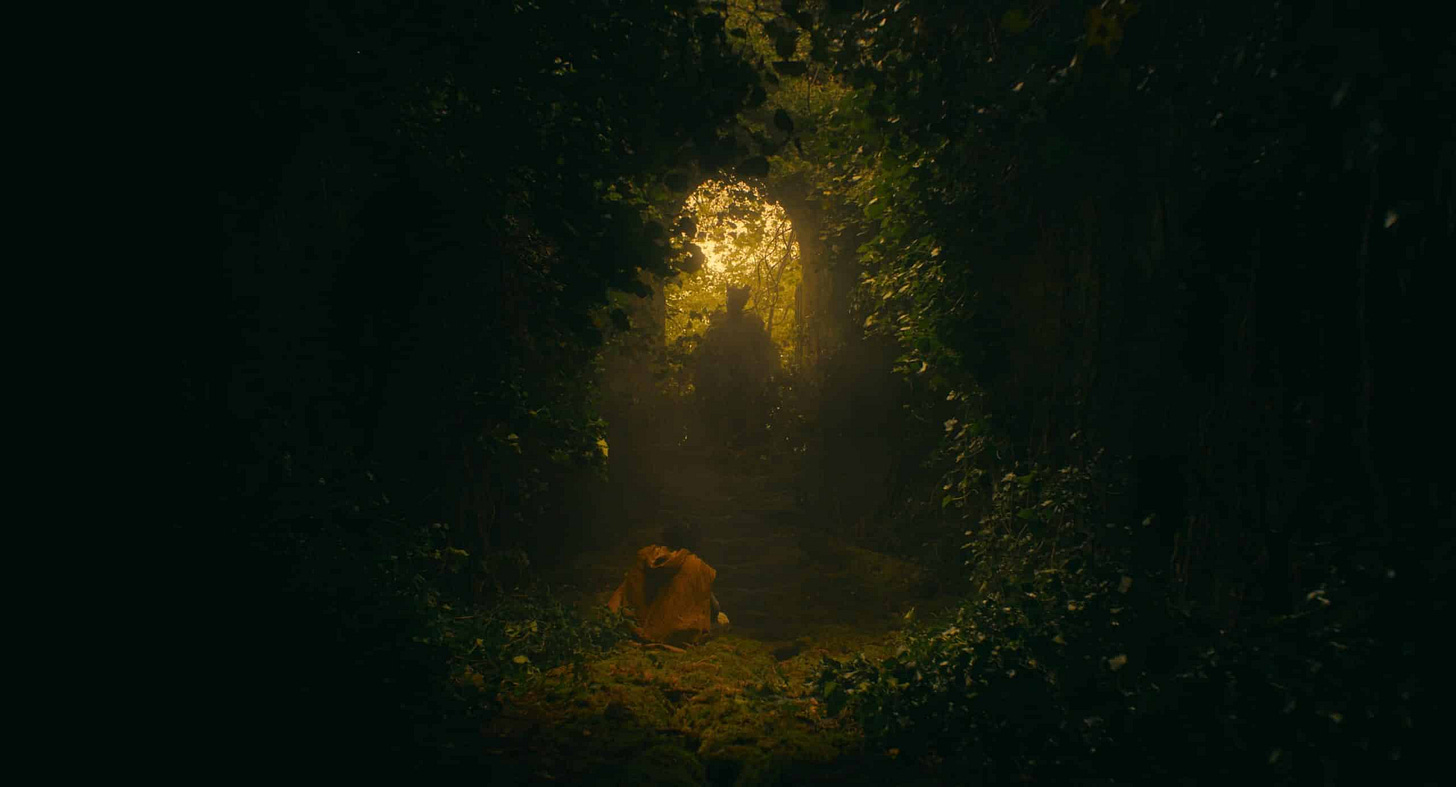
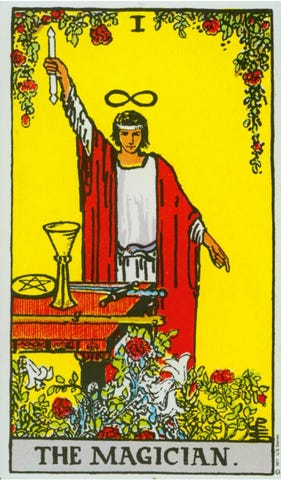
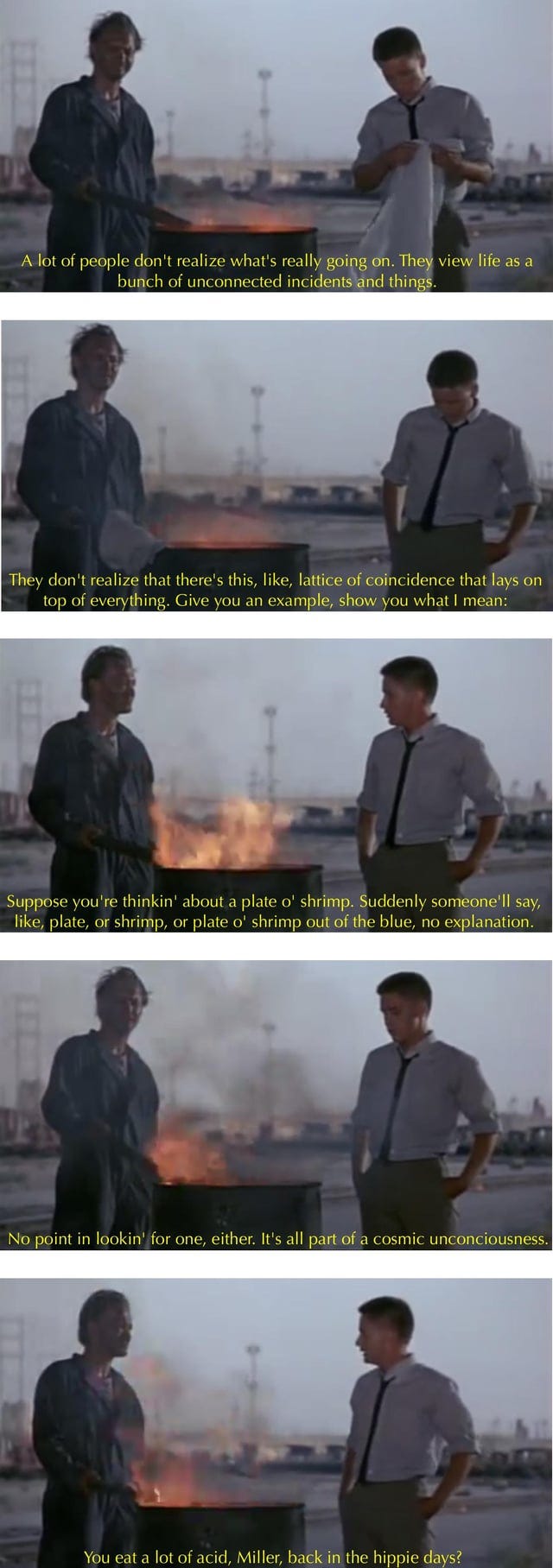
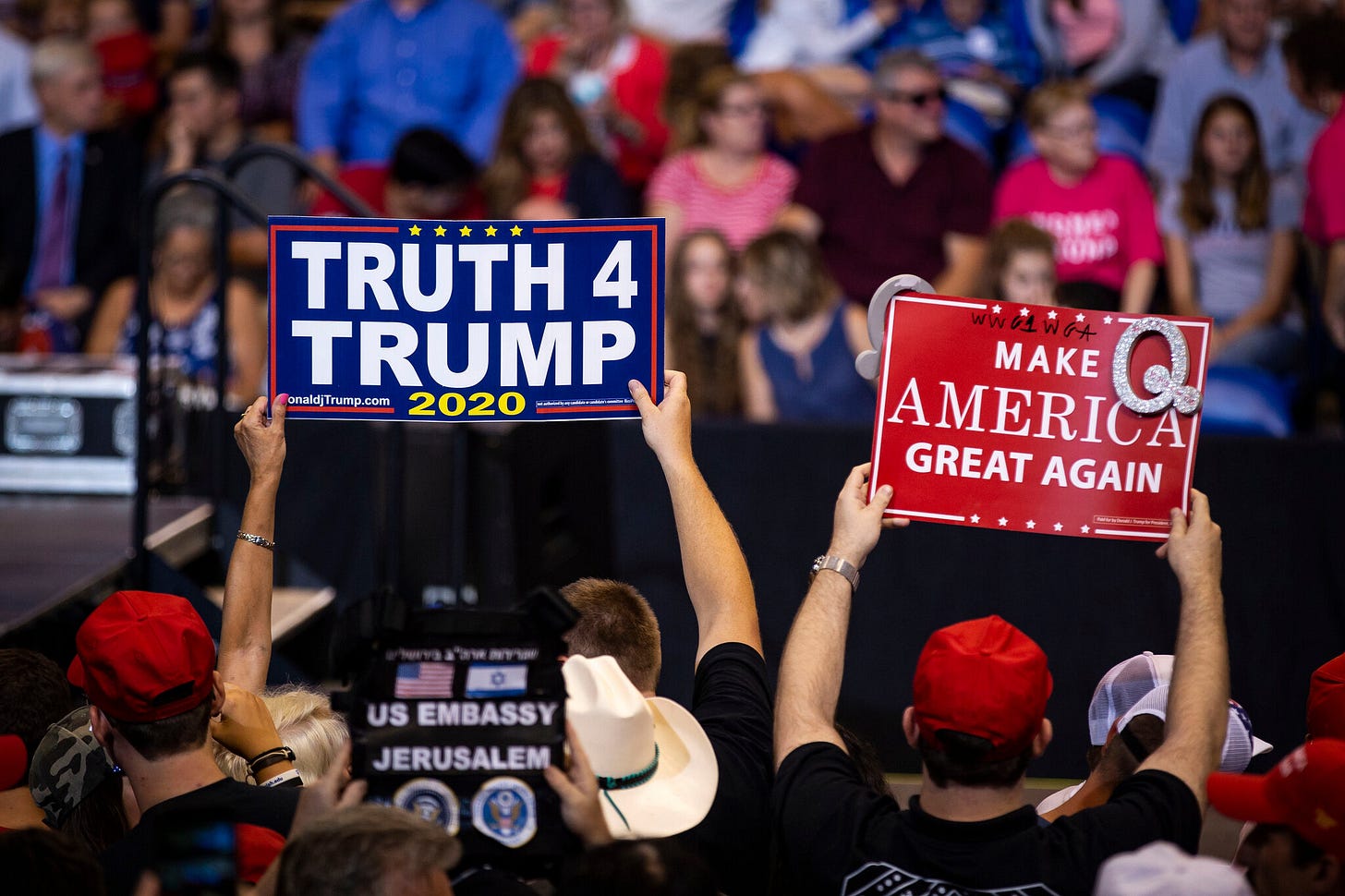


Speaking of synchronicity, I just posted yesterday if anyone read The Illuminatus! Trilogy anymore.
Thanks for this, it was just what I needed.